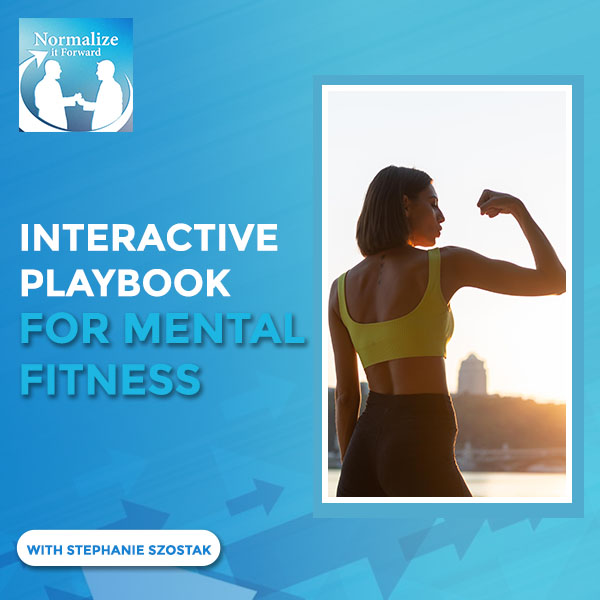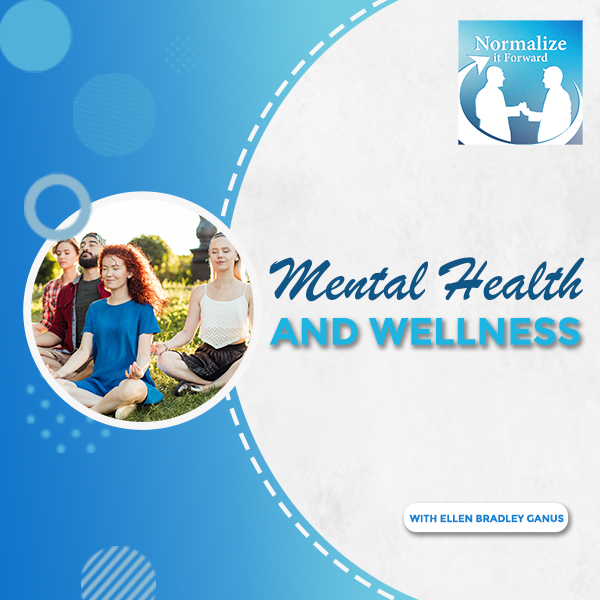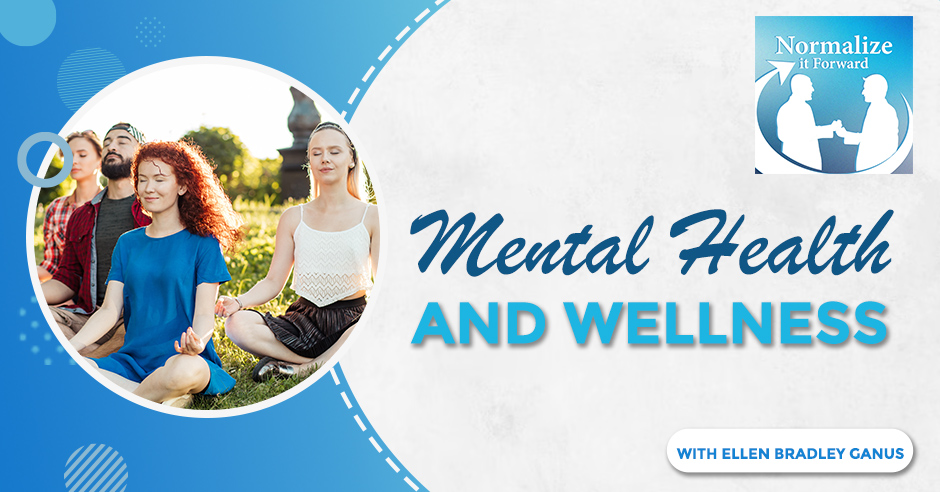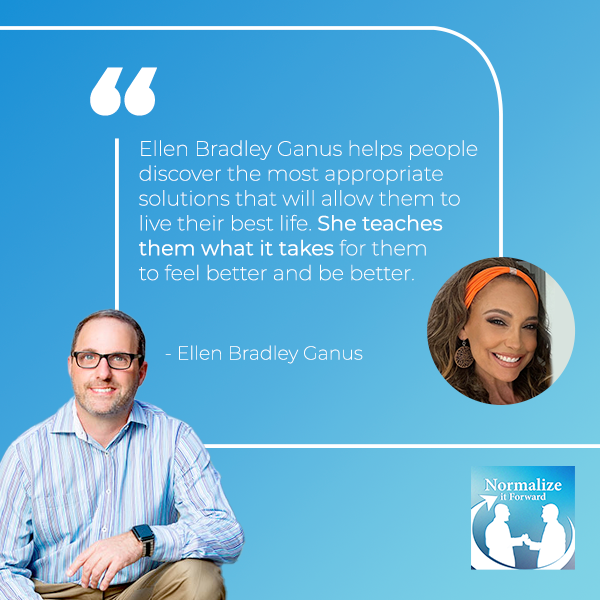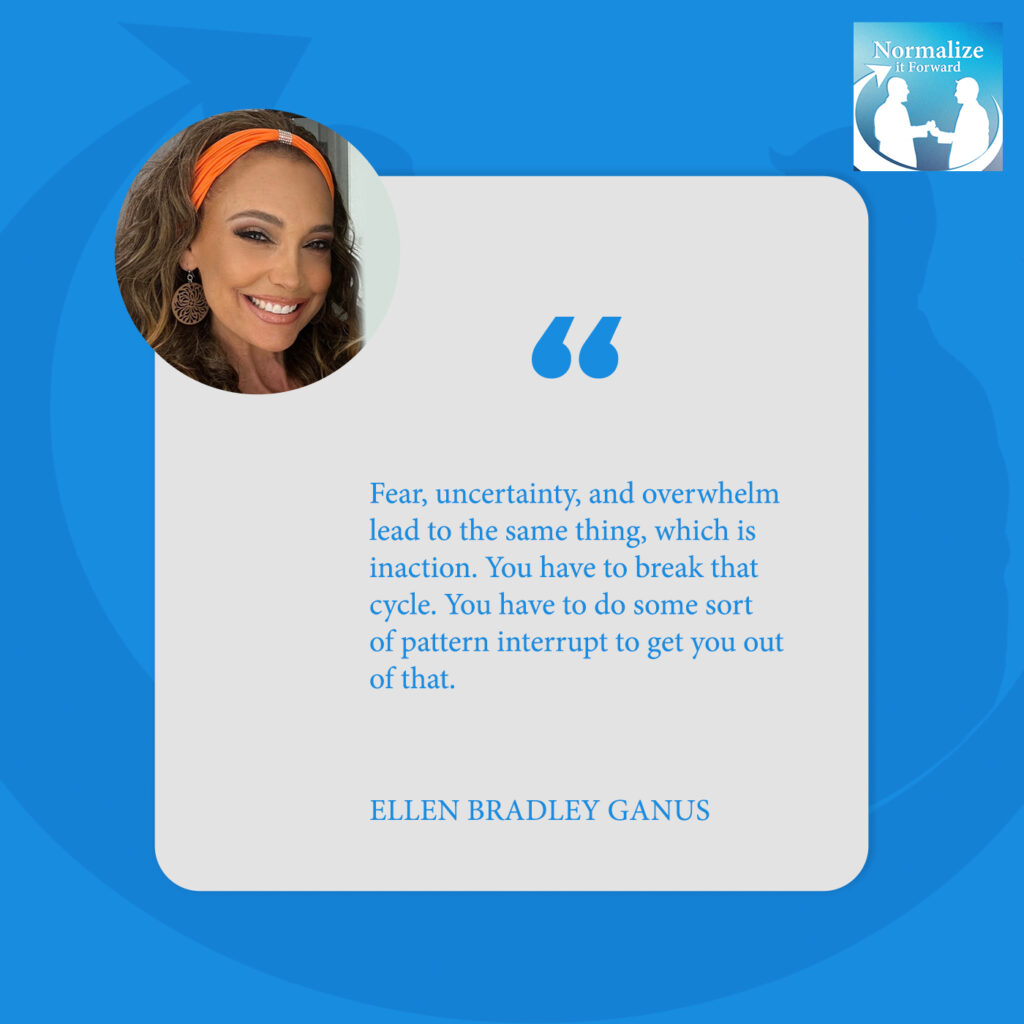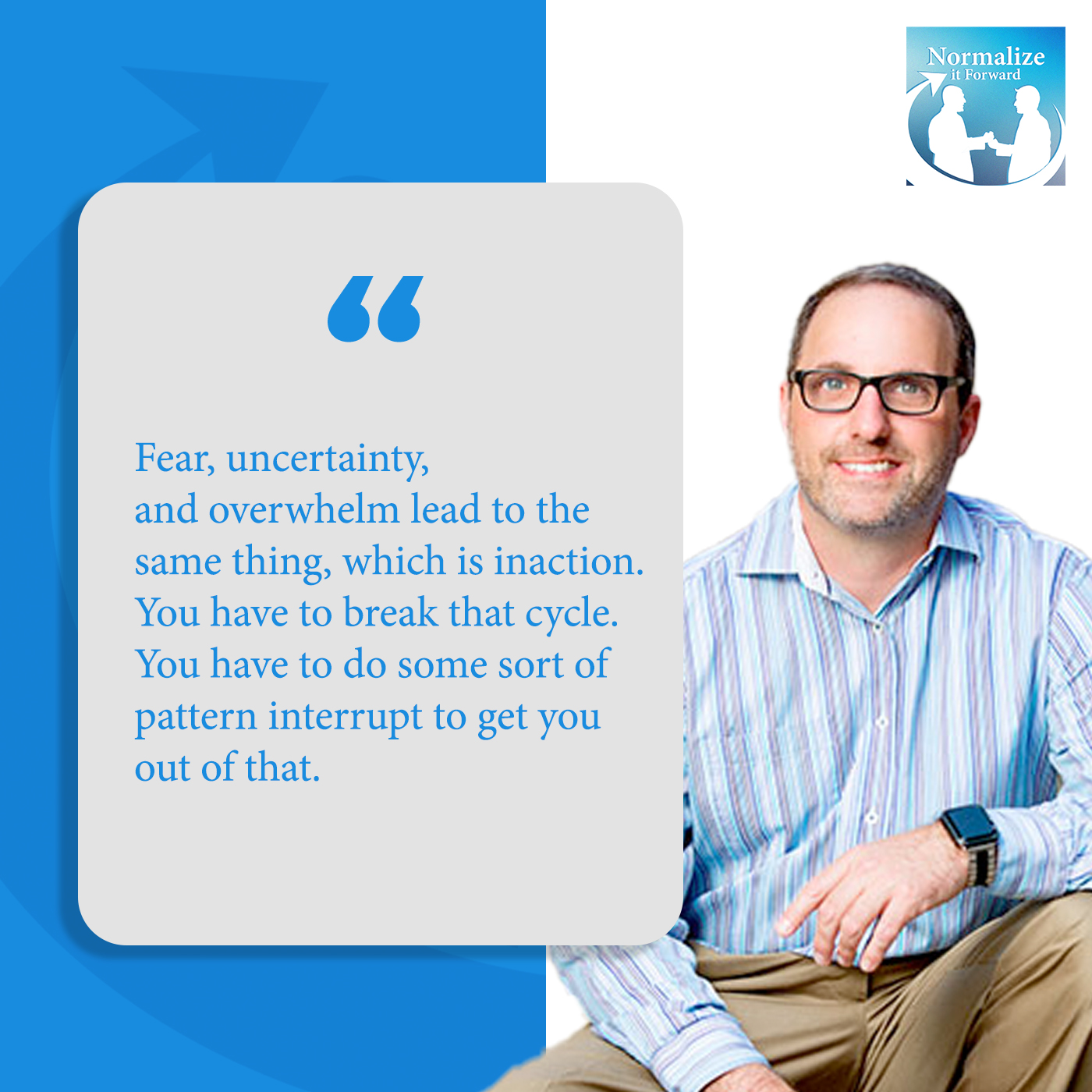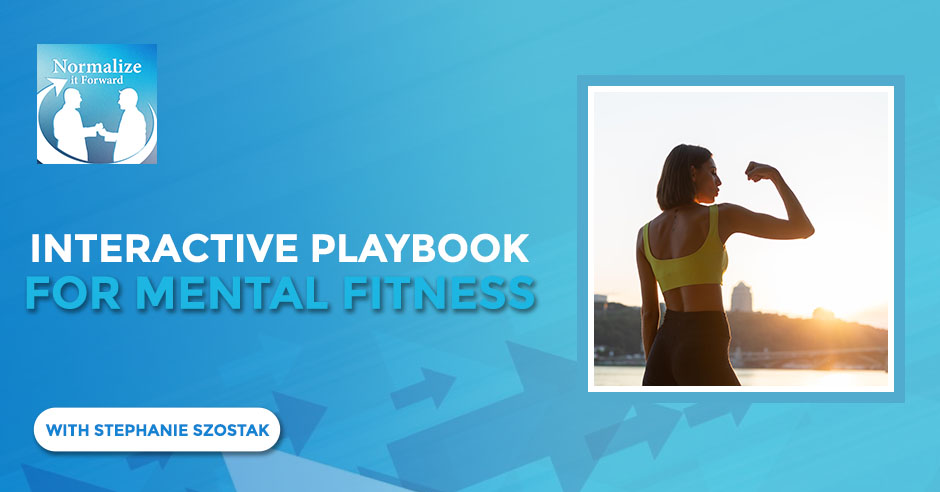
There is no single approach to taking care of your mental health; you do what works best for you. To help people determine the most effective ones for them, French-American actress Stephanie Szostak created the interactive playbook SELF!SH. She joins Marc Lehman to share how this collection of different practices helped elevate her mental fitness, eliminate imposter syndrome, and live a truly authentic life. They also discuss how young people should properly navigate social media, spend more time on their self-care regimens, and escape the pressure of having everything figured out.
—
Watch the episode here
Listen to the podcast here
Interactive Playbook For Mental Fitness With Stephanie Szostak
Welcome everybody. We are welcoming an extra special guest to Normalize It Forward, the podcast that talks openly about mental health and wellness. We are here with Stephanie Szostak, who is a French-American actress best known for roles in Devil Wears Prada, Iron Man 3, and the ABC hit series A Million Little Things, also my very favorite show of all time. She speaks on being an outsider, overcoming failure and mental fitness, and living with authenticity. Ten years into her career, Stephanie suffered from imposter syndrome, which pushed her to address her mindset and develop a personal playbook as a daily practice of mental fitness.
Her book, Selfish: Step Into a Journey of Self-Discovery to Revive Confidence, Joy, and Meaning, which, by the way, is phenomenal, steps into a journey of self-discovery to revive confidence, joy, and meaning, and offers a template for others to create their own unique playbook to cope, grow, and elevate their mindset. As a part of her commitment to mental health, she has donated half of her proceeds from Selfish: Step Into a Journey of Self-Discovery to Revive Confidence, Joy, and Meaning to the mental health organization Give An Hour and is actively working on launching the Selfish app later this year. Stephanie, welcome. How are you?
I’m good. I’m excited to speak with you, Marc. It’s amazing what you’re doing.
Writing The Book
Thank you so much. We are super excited to have you here, and I think you offer a viewpoint that is very unique, and I love what you’re doing as well. Selfish: Step Into a Journey of Self-Discovery to Revive Confidence, Joy, and Meaning is a book that I’ve begun myself and looked into and read about half of it so far. I’m taking my time with it, but it is such a spot-on awesome self-help book. I don’t know if that’s quite the right category, but it’s such a unique book that I really want my listeners to think about going out and getting. Tell us more a little bit about Selfish: Step Into a Journey of Self-Discovery to Revive Confidence, Joy, and Meaning and how that came about.
I like that you used the word self-help because it’s a little bit of a dirty word, I think, but it is self-help because it’s an interactive workbook for you to discover more about yourself, and it’s eight self-reflective exercises. I didn’t make them up. Actually, one of them I made up, the one about joy. They’re versions of exercises that I’ve done through the years that were given to me by therapists or coaches, but all exercises that really I’ve benefited from and that brought me aha moments, helped me be more at ease with who I was, and have more clarity and more confidence in hard moments. The reason they were put into a book was because when I went through my journey of well-being, whether it be meeting with therapists, reading books, or listening to podcasts, I found so much content that was helpful. My challenge was, “How do I remember it?”
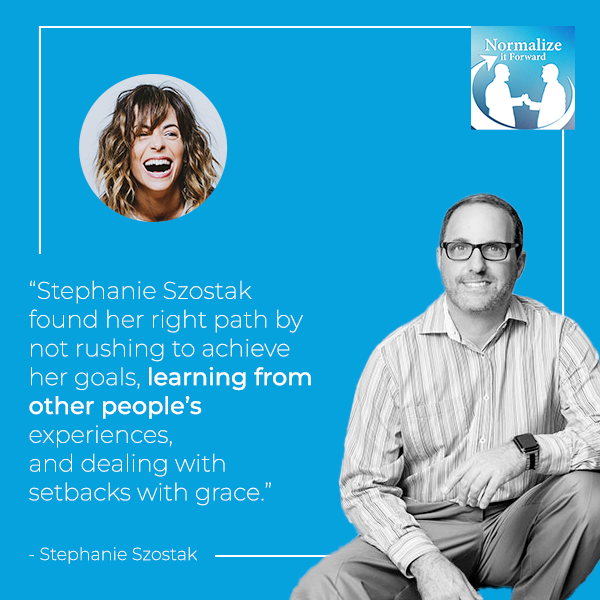
I created what I call a playbook, which is a digital place on my phone. Every morning, I hit play on it. There’s my soundtrack, the music. It’s a little slideshow. After three minutes, it’s a great reminder and start of the day to get in a good mood, to remind myself of what helps me respond, and of what inspires me. I like to say, you know how we have iTunes or Spotify for music? We can curate our own playlists for different moments in our lives. This is curating different playbooks for different moments of your life. You can have a joy playbook. You could have a playbook for every day. You could have a playbook before you go on set or before you take an exam.
I love it. What a great idea.
When I explained this concept, people always were like, “What do you put in your playbook?” I looked at my own, and I realized a lot of this content came from these exercises. The workbook is meant for people to have a foundation, a starter point. Every answer to each exercise that you not answer, but insight that you discover, you will put in your playbook. At the end, you’ll have a great little foundation there.
Self-Care
I love it. I think that there’s so many levels to it. I’ve always said, honestly, my whole career, I’ve always said selfish gets such a bad name. When people have to take care of themselves, sometimes there’s that fine line of like, “Are you being selfish?” There’s that negative connotation. Yet we’re supposed to go to the doctor every year. We’re supposed to get our eyes checked. We’re supposed to get our teeth cleaned. Those self-care habits are really a part of not only being a human being but certainly a part of trying to keep one’s mental health stable. I talk to students about that all the time, the importance of taking care. I’m curious, when you hear the phrase self-care, what does that mean to you?
First, the title Selfish. I just want to give a little shout-out to The Big Brands because they’re a local branding company, and they’re the ones who came up with the title amongst others. They had different names. When I saw it, it jumped at me because it was so counterintuitive. Also, because it had the word self in it and because I could then play with it and say that it’s about taking time for yourself every day.
Self-care, to me, means anything that is going to serve me well. It could be physical things. It could be things for my mind. It could be spiritual things, creative. It’s just things that fuel or build energy within, things that refuel me. I don’t know if you’re asking what specific practices I do, but I think that’s almost irrelevant because we are so different, every one of us. There are so many things out there that you can do for your own self-care, and it’s about finding what works for you.
I think that’s the important part, finding what works for you, because what works for you may not work for me. What works for me may not work for you. Yet, working with students all the time, I hear about so many different ways students chill out or cool off or clear their head. There are certainly themes. There are certainly themes that they can go to. It’s really interesting how young people don’t see how important that is. Do you know what I mean?
Yeah. I think maybe what would be helpful is, instead of saying self-care as a practice, it’s what gives you this feeling after you do it, that you’re like, “I feel like myself.” I feel this opened, open feeling, as opposed to constricted. We all have these two things. For me, there’s a spectrum. I can be judgmental, angry, pessimistic. At the other side of the spectrum, I find myself sometimes trusting and just, like, centered, grounded. What are those things that help you shift on the spectrum?
I love that. I love that because it really takes away the focus on how you get there and just the goal. The goal. We all like being there. We all like that feeling. There are so many different paths to getting there.
Realizing that you do have the agency to get there, the getting there is not external, that we can play a role if we have a little bit of awareness. I think that’s the key. Everything starts with developing self-awareness, understanding what our triggers are or the moments where we lose this groundedness, and then discovering what helps us in those moments.
Everything starts with developing self-awareness and understanding what our triggers are. Share on XCreating Balance
In comparison to young people, obviously you and I have a few years over college kids. We have learned that. We’ve made our mistakes and we’ve stumbled, and we’ve figured out what does help us. I like the word you use, agency. We have agency over making those decisions to say, “I’m going to just throw some earbuds in. I’m going to go for a walk. I’m going to listen to my playlist,” let’s say, and that will help me shift and be in a better zone. Because we all get pessimistic, we all get negative, we all get in that. No one likes that. We’re not a good family member. We’re not a good individual when we feel that.
I’m so happy you remind me that our audience is young people because, going back a few decades, when I was in college, I had a really tough time. I came from France, and I so came to America, had huge culture shock, didn’t know the language well, didn’t know humor. I felt really isolated and didn’t have a sense of belonging, so much so that I actually cried every day. I want to say, sometimes we want to be in that space. I remember being in my room and listening intentionally to sad music. There’s a fine balance about staying in that space too long. It’s not serving you well, but also you don’t want to be like, “I’m not feeling this,” and not taking the time to acknowledge what you’re going through.
I like the word coexisting. We could have sadness, we could have pain, suffering, and find within that, make space for small moments of joy, or taking a walk, or listening to music. “I’m going to try to listen to music that makes me feel good.” Maybe the music that reconnects me to a really cool memory that I had. I love this idea of taking time when we don’t feel good but making space for light as we are in that space.
As a human being, we’re going to feel both. I think what you just said about how you felt when you moved to the States and started school, so many college students are feeling right now. Many of them have started their semesters, and many conversations have been had, even by myself in the last few weeks with new freshmen, where you’re wondering, “Did I make the right choice? I’m not making friends. What is this all about?” We live in a bit of a world where, especially young people, think things happen instantly. “I’m going to make friends. I’m going to learn the new culture. I’m going to learn the new life. Everything’s going to happen in one day,” when it really doesn’t. It takes time.
We have to show ourselves a little bit of grace to say, “It’s going to take me some time.” How I get through that is really what you said earlier, which is finding some opportunities, finding some decisions to take some breaks, maybe not sit in my room and cry all day. Maybe I need to be able to get out and take some walks and give it a chance because, to me, college is not for everybody, but it is an amazing journey for a lot of young people these days.
I’ll share a little bit of my story because it’s also not linear for a lot of us. I came to the College of William and Mary to play golf. I was playing on the golf team. On paper, all that is like, “How wonderful.” Every day, I was completely lost. I remember going in the hallways and people being like, “What’s up?” Looking up to the ceiling and being completely confused by what they were saying. If I saw people a second time, they’d say again, Hey, and I would say nothing because I already saw you. Why should I say “Hey” again? That’s not part of my culture. People were like, “You’re so rude. Why don’t you say, Hey,” and I was like, “What?”
I decided to go back. I also, at home, had an older brother who struggled through heroin addiction. That wasn’t something that I wanted. He was not using anymore, but he was sick. He had hepatitis C and cirrhosis. I didn’t want to share this home trouble with anyone because I felt that that was going to make me be different. I was already feeling different enough. To me, it seemed like everybody was all happy and had it all figured out. They all went to dinner all together in a crowd, and there I was with my tray by myself. Eventually, I decided to go back home for sophomore year abroad. I went back to Paris as a year abroad and felt like a loser for doing that. My brother passed away when I was home that year.
I’m so sorry.
Thank you, but it was actually amazing because I was there with him. I also met my now husband, who was American in Paris. Eventually, I went back my junior year to William and Mary and graduated. It wasn’t like, and I played golf again and had the best experience. There’s no one way to do things. I just want to say for anyone who’s listening to this, young people, listen to your intuition. It takes time to find your tribe. Maybe it’s not a big crowd tribe. Maybe it’s just 1 or 2 people, but like you said, have grace for yourself. It takes time.
Listen to your intuition. It takes time to find your own tribe. Share on XSocial Media
So important. I appreciate you sharing all that. It’s funny how life works out. You have the twists and the turns. You go back home for some nurturing, and you end up meeting your husband back home, which is wonderful. It’s funny, too. I had the thought when you were talking about the crowd going and you feeling alone. I had the thought of like, that’s magnified because of social media. We have young people that not only are feeling that, but they’re also looking at their phone.
It seems like everybody is going to parties every night and having a grand old time. “I’m the only one who’s not.” I think your words are so important, Stephanie. I think that concept of, number one, statistically speaking, they’re not the only one. There are a lot of kids struggling out there. Number two, realizing this is going to take time. It’s not something that can be rushed. There are thousands of ways to make this work and figure their journey out. I appreciate you sharing yours. I think everyone’s got a story and how they got there.
What you just said about social media and basically seeing people’s highlight reels all day long also makes me think, I’m an actress. I actually have a highlight reel that I send to directors, or my agent sends to directors. When I look at it even me, I’m like, “Holy crap. Look at all this.”
You’re impressed by yourself.
By the work. I’m like, “That’s a lot.” I say that is actually 5% of the work that I do because the other 95% is the behind the scenes. It’s me in my living room doing an audition tape with my husband and not hearing back. It’s being rejected. It’s not having work since last November. You have no job. It’s oftentimes feeling like I’m going from rejection to rejection and failure to failure. Remembering that all of us are highlight reels is very different from the behind the scenes, from the reality. There’s something that helped me in the moments in my career, the dry moments. I heard a coach, I think it was a football coach, say, “Treat moments in life, like setbacks, as the athlete treats the offseason.” They’re not playing. They’re not in the season, but what are they doing? They’re working on their skills. They’re practicing. They’re becoming stronger.
Treat setbacks in life just like an athlete treats the off-season. Share on XI remember when I heard that, I was like, “This is so great. I’m in my offseason season. What can I do to better myself?” It’s like, “Maybe I don’t know what, but what do I want to feel? What do I want to work towards?” You just take those steps to find somebody who can help you. Maybe it’s just taking on a new hobby, learning something new. I think that’s a very helpful thing to also keep moving and not just stay stuck.
I love that. I have to say, I use the word authentic in my introduction of you. You’re a very authentic person. I can tell when we talk, you’re very honest. You’re able to touch on things that a lot of people will just hide. To me, I think that one of the refreshing parts of that, Stephanie, is that we all have these sides to us. We all have these difficulties that we struggle with. Just because young people don’t necessarily see it, let’s say, through social media or through TVs and movies, it doesn’t mean that these people aren’t human beings and these people don’t have very similar struggles.
Getting Grounded
I appreciate you sharing all of that with us. I find your story fascinating and really helpful to hear about. I’m curious, when it comes to the different things that have helped you along the way in your journey, get to authenticity and get to feeling so grounded, lots of times people will reference mind-body wellness experiences, therapy, different types of assistance, maybe alternative assistance. I’m wondering, what have you found to be helpful in your own journey?
First, what pushed me to start my own journey was really a moment in my life where I felt so lousy, and it was related to my career, and it was the opposite of authenticity. I was so worried about what other people were going to think of my work not being good enough that it impacted not only my performance, but it impacted my relationships and my well-being. It was so bad. I felt so bad. My self-value was all tied into my career and how successful I was or not. That’s what pushed me to seek and search.
I think the beginning, it’s weird. I picked up this book by Deepak Chopra. I would have been embarrassed if anyone had seen me do that because I was like, “Self-help? What is that? I’m an athlete. I know how to compete. I’m in charge. I know how to basically take care of my mental game.” There is a book by Deepak Chopra, and it was called The Seven Spiritual Laws of Success: A Pocketbook Guide to Fulfilling Your Dreams (One Hour of Wisdom), but it was spiritual laws. There was something that grabbed me. When I read it, the way he spoke really hit home with me. That’s just me. I think it’s almost like dating, when you find a therapist, it’s like dating. You have to find your language. This spoke to me for the time that I was at. He spoke a lot about concepts that I had not really experienced, like gratitude and trust and surrendering and giving, but just being really conscious about doing these things every day.
I made myself flashcards every day before I went on the set. I focused on giving to everyone, and it was like maybe a compliment, maybe a smile. As I was doing that, it got me out of my own head, first of all. I started noticing other people on set that were, they were doing it. I was like, “You guys are superstars.” That’s why you’re super, from the actual movie stars to the people in the crew. That made me feel more connected to others. That was the beginning for me. I started a gratitude practice, which I have to this day. I use a five-minute journal. It’s every morning, finding three things that I’m grateful for. Even when we are not having good times in our life, you actually realize you can find things to be grateful for.
There’s another practice that I learned later, when something bad happens, my husband had a health scare, we were like, “Can we find three things to be grateful about this?” We did. All of a sudden, it shifted our perspective from “Why is this happening? We don’t want this to happen. Let’s shift our perspective.” Self-discovery came after that, which was journaling with specific questions to understand more of what filled my heart, what kind of life I wanted to live, what being authentic meant in the first place. If you had told me that before, I would have been like, “I have no idea.” It turns out a big part of being authentic for me is embracing not having it figured out and being okay with all the vulnerability.
That was really hard. It’s not an easy thing to be vulnerable. It also doesn’t mean that you’re going to talk to everybody and just empty your dirty laundry to everyone or whatnot. Even as a student, having the courage to raise your hand and say, “I don’t understand this,” or if somebody tells a joke and you don’t understand, being like, “I don’t get it.” You can practice being authentic by doing things that are a little uncomfortable, like being a little vulnerable, a little bit every day.
I love that you use that word practice because it really is a skill that you have to work at developing. I’m going to repeat something you mentioned because I feel like it should be on a t-shirt, embracing not having it figured out, like being okay with that. The bottom line is none of us have it figured out. We all walk around like we do. I think that that piece, for so many people, causes a lot of inner angst. Being able to get to that place where you could laugh at yourself a little bit and realize, “If I answer a question wrong, I still tried.”
There’s an attempt there. Maybe it was funny. Maybe the answer was funny, but I still tried. Not taking life super seriously and realizing that part of life, I would say a big part of life, is learning along the way and recognizing, we weren’t born knowing how to tie our shoes or how to brush our teeth or how to comb our hair. We had to learn all of those things. Why would this stuff be any different?
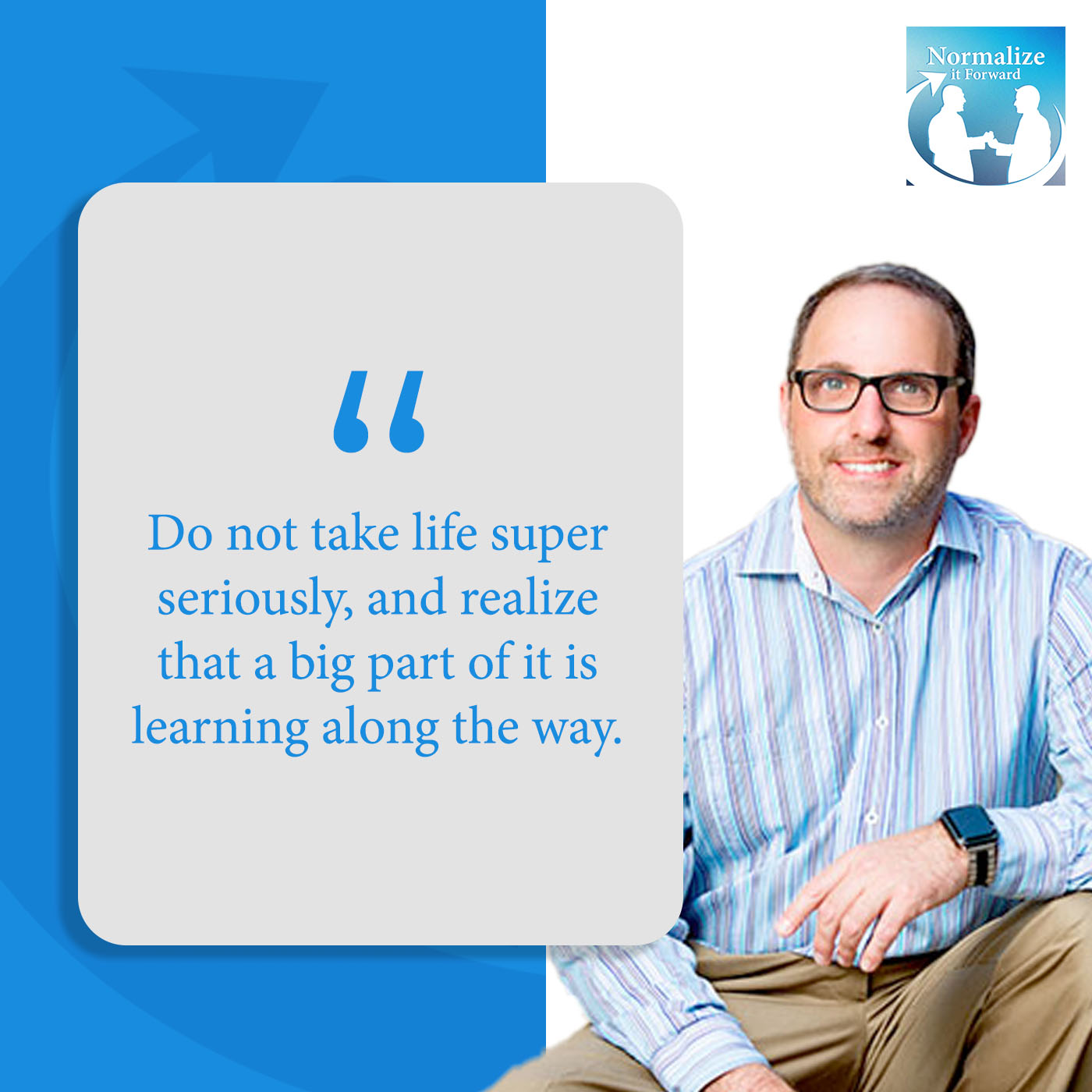
Also, we’d be insufferable if we had it all figured out.
That’s right. It would be definitely hard to be around. I appreciate you saying that, especially for young people. There is that notion of, like, for some reason, a lot of young people think they should have it all figured out. I think as you get further into adulthood, you really start to recognize, not only don’t I, but most people are on this journey.
I would even say that’s the beauty of life because, I think, if you’re young, or maybe it’s hard, but like from where we are, if I look back, I’m like, “What? I would have never imagined this.” I studied business. I never took an acting class until I was 29 years old. You don’t know what life is going to throw at you. You also don’t know what one way, that cliché of one door closes, another opens. I remember after college, I thought I was going to go into sports marketing. I interned at this big company. It was called Advantage International, now it’s something else, but it was one of the big three. I interned on a golf tournament in New Rochelle, had the best internship. I got along well with people, and I was convinced it was going to lead to a job. The big boss called me into his office and he said, “You were so great. We love you. Blah, blah, blah. I’m so sorry, but I’m not going to give you the job. You’re going to be bored, and I won’t be able to give you something better soon enough.”
Who knows if that was true or not. What I heard was, “We didn’t like you. You don’t belong here. I’m just making things up to make you feel fine about yourself or a little better about yourself.” I was devastated. I also felt like, “How could I be so wrong in my judgment, thinking I was going to get this job?” You know what? That job led me to do a marketing job at Chanel. That led me to become a model at 26, which I never would have even wanted to do, but somehow that happened. That led me to a theater class at 29, to discovering my passion in life. Life is so weird. It’s never too late to try something.
Awareness
That’s a good segue to this. I have to say, one of the things that I’ve so enjoyed about this and making some lists that go on here is there’s a part in here that talks about who you admire and why. One of the people that came out for me was similar to you. I have my own story. I didn’t know what I wanted to do until I was a junior in college and felt lost. I was a communications major. I hated it. I went to see my advisor, and my advisor, who was a sweetheart, turned out to be a family therapist. I thought I’d have a twenty-minute meeting. We had a three-hour meeting. She handed me her textbook of her class. I went home. I’m not a reader, but I went home, and I read that thing cover to cover, stayed up all night reading the book. I came to her class the next day, and I said, “Give me more.”
It was my own discovery of my passion and a recognition of, like, there was something about this topic that moved me. I really enjoyed it and wanted to know a lot more. I think that for young people, you can’t really plan that. I think a lot of young people, I had someone say to me yesterday, as a senior in high school, seventeen years old, says to me, “I don’t really know what I want to do.” I’m like, “That’s funny. I didn’t either at seventeen.” I think for a lot of young people, they think they’re supposed to. No one ever really says to them, “Here’s my story. I didn’t discover this until I was 29. I didn’t discover this until I was 25.” To take that pressure off, I think, is amazing.
You hear that word success. I use it because I want to redefine success. Success is finding your own life, is following your own path. It’s having also the awareness, when you hear your advisor say something, and you realize, “This is moving me, to say, I want more. Let me explore this.” That takes courage because to say, as a junior, “I’m going to shift from communications,” that takes courage.
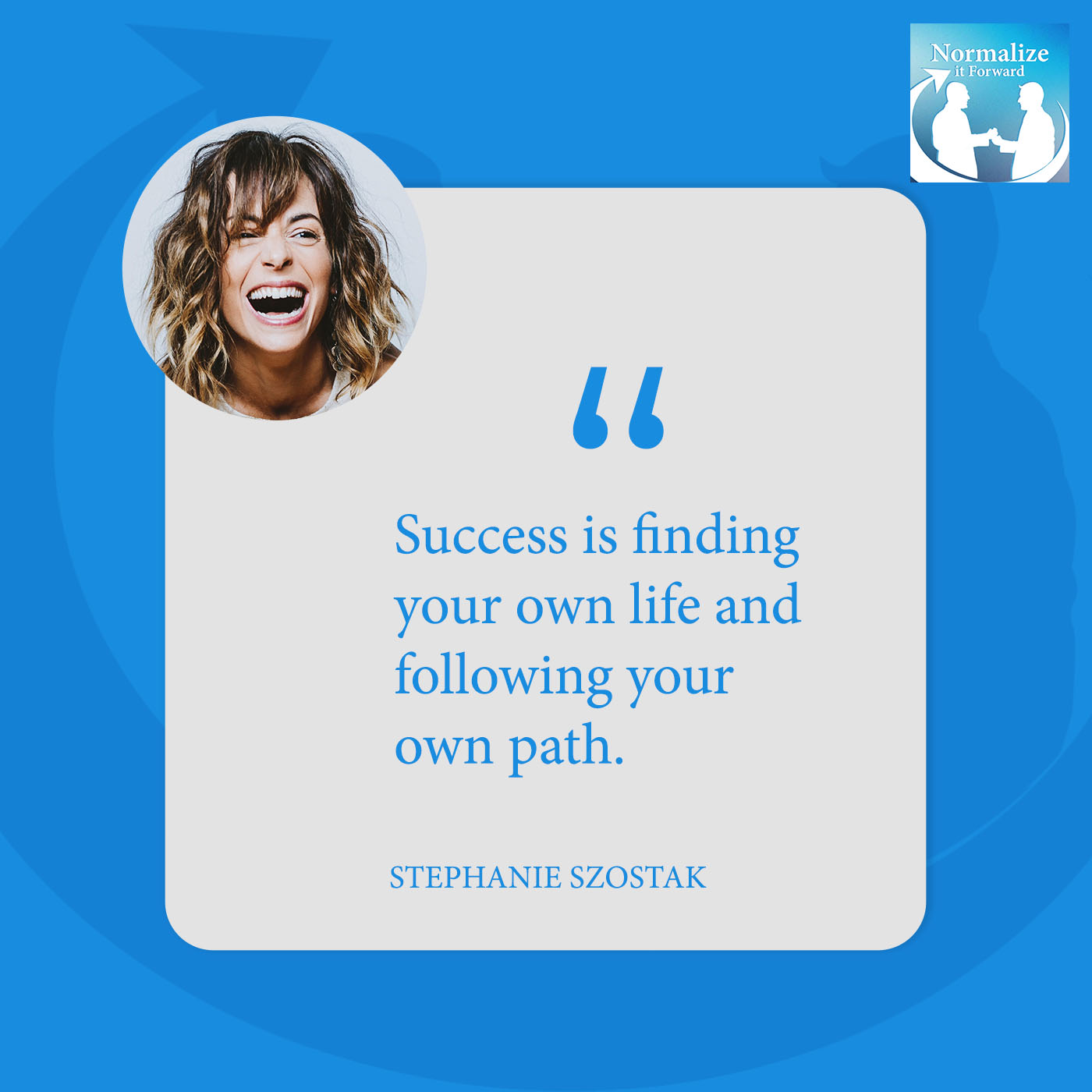
SELF!SH
It did. I think that awareness is such a big part of that, to understand what passion is, which I think a lot of young people aren’t even really clear on. When you think about, “This is something I would consider doing for the next 50 years. I’d enjoy a lot of it,” there’s got to be some passion involved in that. Stephanie, let me shift back to this for a minute because I want to give our listeners an opportunity to hear about this. Tell us a little bit more about Selfish: Step Into a Journey of Self-Discovery to Revive Confidence, Joy, and Meaning, and you had mentioned before that there’s an app coming out, and I just want to hear more about where this has come from and where this is headed.
In a nutshell, Selfish: Step Into a Journey of Self-Discovery to Revive Confidence, Joy, and Meaning is a playbook for everything that elevates your mindset. There’s a workbook, the actual book that is an interactive workbook that you answer questions to, will help you discover the content to put in your own playbook. This content is meant, you will discover, I’m not telling you what to put in there, but you will arrive to stuff that revives confidence, joy, and meaning, hopefully. The app, this is the only reason I’m doing this, is because I needed this tool. It doesn’t exist anywhere. We have access to so much great information, whether through you, books, podcasts, even social media. We can have accounts that inspire us. I’m sure a lot of your listeners take screenshots on their phones of things that inspire them. I did the same. The problem was I never looked at those screenshots again, or they were scattered.
If you go to SelfishPlaybook.com, you can download the beta version of the app. I use it every day. It’s in beta because we’re still improving it. It’s basically, imagine your Instagram grid, but it’s private. It’s for you. In there, you’re going to put all the stuff that inspires you and the wisdom that you come across, things you’re grateful for, your goals, whatever it is you’re working on. You can create different grids or different playbooks. For me personally, I have one that is before I go on set. I know my son is like, you can have one before an interview, a job interview, or before a test. I have one that’s just about nature inspiration. Although I love to go in nature, and so I take pictures and I put them in there. If I watch it, you can hit play, and then it plays as a slideshow with music. There’s a science that shows that when we mix meaningful words, images, and music, we create an emotional experience, and that boosts our mood. It helps us learn and remember.
You could have one with your takeaways from Marc’s session in there and just watch them. What I try to do is watch it every morning before I go on social media, before I look at the news, before all the noise comes and hijacks my mindset and gets me in reactive mode. I take just three minutes to remind me of the stuff that serves me well.
Such a healthy habit. How often do we do things mindlessly? We pick our phone up right when we get up, and we look through our emails or social media. This is such a healthy habit to insert. I love the concept. It’s simple. It’s a tool. It’s with you all the time. You can grow it. You can grow it into multiple.
You can archive things that you’re like, “I don’t need this anymore.” You archive it.
Guest Nominee
I love it. Let me ask you, we had talked a bit offline, so the concept of Normalize it Forward is, obviously, we want to continue to have these conversations and be talking openly about the topics of mental health and wellness. Typically, I ask for a person to be nominated, an individual, a coworker, friend, or relative to be nominated. You were kind enough to nominate, I’m going to screw her name up, forgive me, Dr. Trina Clayeux from Give an Hour. Tell us a little bit about Dr. Trina.
Trina is the CEO of Give an Hour, which is a mental health organization that I came to know through A Million Little Things. What they do is they have a network of mental health professionals who give an hour of their time to people who need mental health resources. They also work with populations who’ve suffered from human-made trauma. They work a lot with veterans.
They will go to this base that they’re working with and assess the needs of the population and then give them education and skills. They also train peer support groups in those populations so that, when the work is done, there’s community, and somebody who’s maybe suffered from human-made trauma and feels now that they’re in a place where they can help somebody else can do that. I think a lot of us, we need mental health professionals, but we can also benefit from shared experience. Human to human.
We need mental health professionals, but we can also benefit from shared experience. Share on XEpisode Wrap-up
What a great organization. Thank you so much for nominating her. I look forward to reaching out and getting her on the show. Just want to thank you. Thank you for your time, your energy. I know you’re busy, and I appreciate you just making some space and talking to our listeners about all of these topics that are so important. For those of you that are looking to get an awesome read, please get out there and get Selfish: Step Into a Journey of Self-Discovery to Revive Confidence, Joy, and Meaning. It’s a fantastic book. I’ve learned a lot myself just from the half of what I’ve done in it so far. Get out there and take a look. Again, Stephanie, thank you so much for your time. I really appreciate it.
Thank you for all you do. Thanks for having me, Marc.
Appreciate it. Have a wonderful rest of your day. You take care.
You too.
Thanks. Bye-bye.
Important Links
- Stephanie Szostak’s LinkedIn
- Stephanie Szostak’s Instagram
- Selfish Playbook
- Give An Hour
- Selfish: Step Into a Journey of Self-Discovery to Revive Confidence, Joy, and Meaning
- The Seven Spiritual Laws of Success: A Pocketbook Guide to Fulfilling Your Dreams (One Hour of Wisdom)
About Stephanie Szostak
 Stephanie Szostak, is a French-American actress, author, speaker, and Give an Hour ambassador. She speaks on being an outsider, overcoming failure, mental fitness, and living with authenticity. She is best known for her roles in The Devil Wears Prada, the ABC hit series A Million Little Things, Iron Man 3, and Dinner for Schmucks.
Stephanie Szostak, is a French-American actress, author, speaker, and Give an Hour ambassador. She speaks on being an outsider, overcoming failure, mental fitness, and living with authenticity. She is best known for her roles in The Devil Wears Prada, the ABC hit series A Million Little Things, Iron Man 3, and Dinner for Schmucks.
Szostak left her native France to study business and play Division 1 golf at The College of William & Mary. At twenty-nine years old, she left the corporate world behind to gave the acting world a try. Ten years into her career, Stephanie suffered from imposter syndrome which pushed her to address her mindset and develop a personal Playbook as a daily practice of mental fitness.
As part of her commitment to mental health, she wrote SELF!SH, offering a template for others to create their unique Playbook to cope, grow, and elevate their mindset, with half of her proceeds going to Give an Hour. Szostak is actively working on launching the SELF!SH app in Q4 of 2024.

